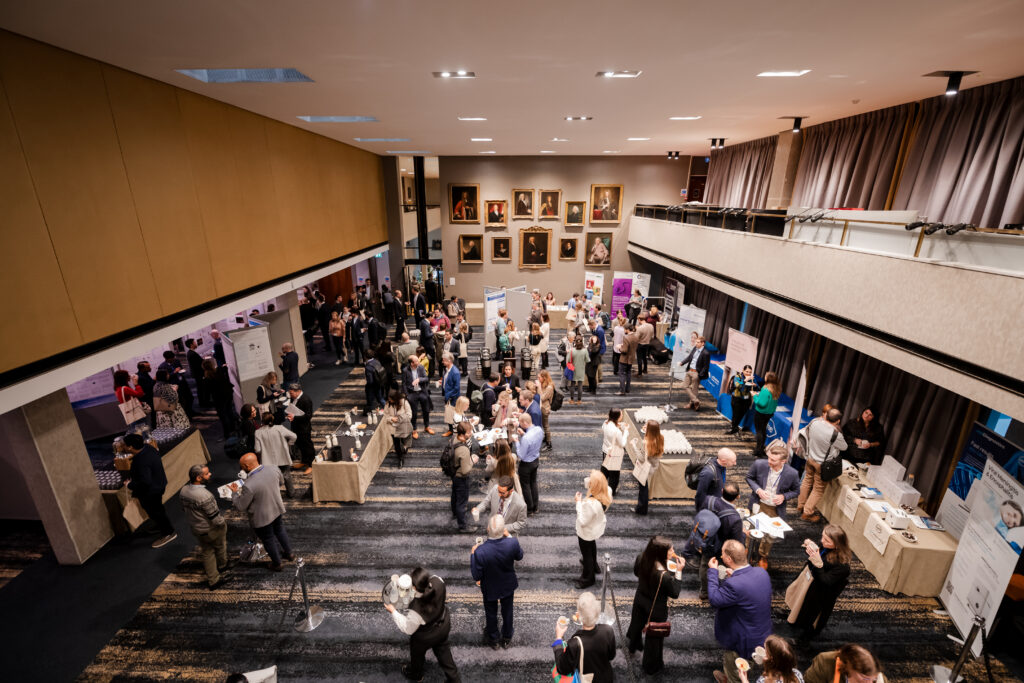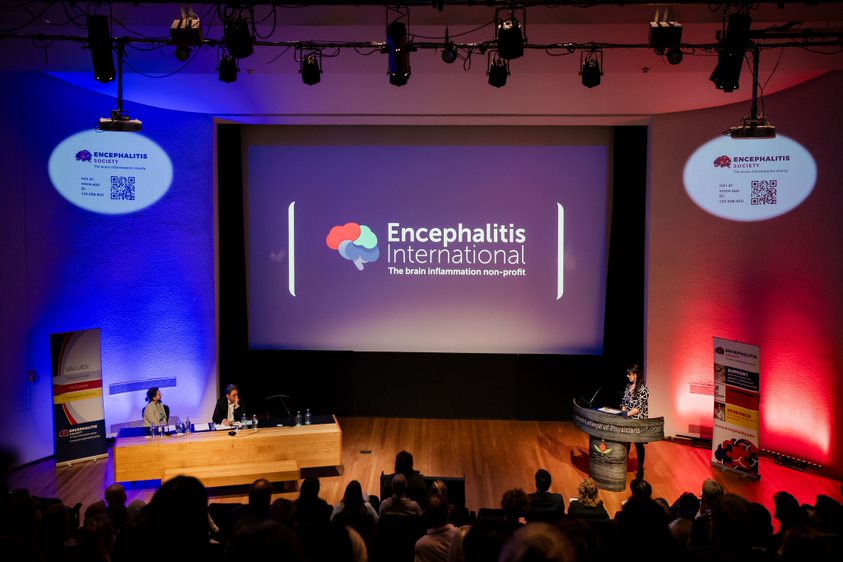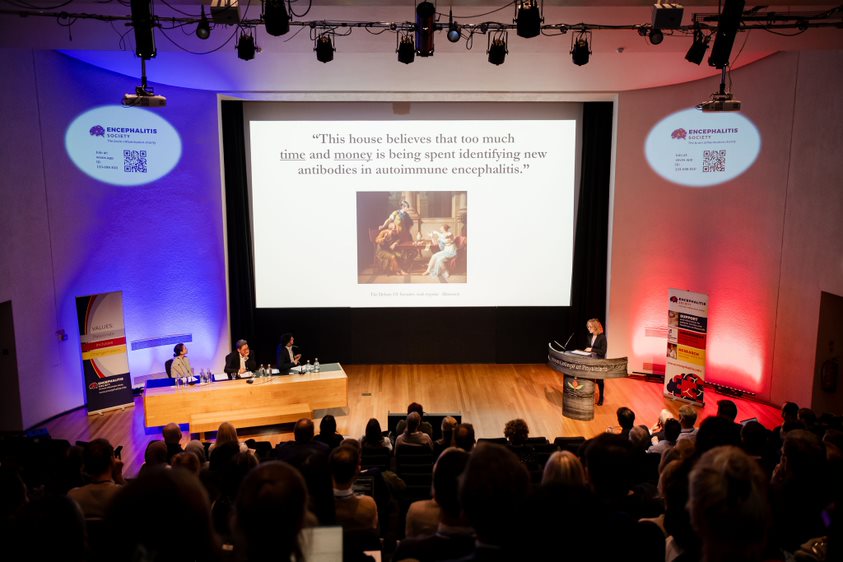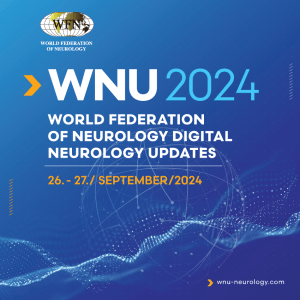The 2023 Encephalitis Conference was held at the Royal College of Physicians in London on 5th December 2023. 469 delegates from 57 countries attended in person and online, making it the largest Encephalitis Conference to date. The conference featured global leaders from diverse clinical and scientific backgrounds covering groundbreaking research into infectious and autoimmune encephalitis, as well as many other associated neurological conditions.

Prior to the main conference, satellite meetings were held on 4th December featuring a workshop on “How to Get Your Grant or Fellowship” presented by Dr Mark Ellul, University of Liverpool, UK and Associate Professor Deanna Saylor, Johns Hopkins University School of Medicine, USA and University Teaching Hospital, Zambia, who participated remotely. They shared their experiences of finding and obtaining funding opportunities for researchers based in both high and low-middle income countries. Although the session was primarily aimed at early career researchers, the lessons from their experiences remained relevant to more senior attendees. Key messages conveyed to the audience highlighted the importance of resilience and persistence in the face of rejection. Following the workshop, a data blitz poster presentation session was chaired by Professor Sarosh Irani, Mayo Clinic, Florida, USA; Dr Thomas Pollak, King’s College London, UK and Dr James Varley, University of Oxford, UK, where twelve speakers from eight countries presented a fascinating range of pre-clinical and clinical research including new diagnostic tests, biomarkers and clinical trials in encephalitis, setting the bar high for the following day.
The main event on 5th December was kicked off early with a breakfast session, a new addition to the conference, for those professionals new to encephalitis management and research. Professor Benedict Michael, University of Liverpool, UK and Professor Sarosh Irani, Mayo Clinic, USA, presented introductions to infectious and autoimmune encephalitis respectively. The conference was opened by Dr Ava Easton, Encephalitis International and Dr Nick Davies, Chelsea and Westminster Hospital, UK who both chaired the first session starting with a keynote lecture provided by Dr Tarun Dua, World Health Organization. Dr Dua updated delegates with an overview of the World Health Organization’s strategic plan to reduce the burden of neurological disorders globally. The approach involves working alongside governments, health and agricultural sectors to implement immunisations and infectious disease eradication. This is aimed to mitigate the risks of emerging infectious diseases that cause neurological disorders reducing morbidity and health inequalities.
Following the first keynote lecture, Dr Sophia Michael and Dr Christine Strippel, Oxford Autoimmune Neurology Group, UK, delivered a joint talk on LGI1 and CASPR2 antibody encephalitis from their international studies of over 240 patients. They described the clinical features and presentations of the participants, as well as the long-term sequelae that persist several years after the onset of these types of encephalitis.
Mr Adrian Gervais, Paris Cité University, France presented fascinating work from his PhD on West Nile Virus (WNV) encephalitis. He presented findings which identified auto-antibodies against IFN-I that can result in IFN-I deficiency and underlie severe WNV infection and encephalitis. Mr Gervais suggested that screening for auto-antibodies for IFN-I could help identify individuals at risk of more severe forms of WNV encephalitis and could indicate that IFN-I therapy is a viable treatment for those individuals. This will require further study.
Joining the conference remotely Dr Tina Damodar, National Institute of Mental Health and Neurosciences (NIMHANS), Bangalore, India updated the conference with Encephalitis International funded research in the development of a novel diagnostic test for scrub typhus, a major cause of acute encephalitis syndrome in India. The condition affects up to half a million people each year and can be treated with oral antibiotics, therefore earlier diagnosis can help direct appropriate treatment and aim to improve outcomes for those affected, reinforcing the importance of this research.

After an initial viewing of the posters, the second session was chaired by Professor Carsten Finke, Charite-Universitätsmedizin Berlin, Germany and Dr Matteo Gastaldi, Neuroimmunology Research Unit Pavia, Italy. The session was kicked off by Dr Joseph Kuchling, Charite-Universitätsmedizin, Berlin, Germany, who provided a radiological perspective with a series of cases of NMDA receptor encephalitis associated with Multiple Sclerosis (MS), informing clinicians to be mindful of overlap with MS when reviewing people with NMDA receptor encephalitis.
Dr Greta Wood, University of Liverpool, UK described findings from the COVID-19 Clinical Neuroscience Study. Within the presentation, she outlined the significant impact COVID-19 has on cognition, equivalent to 20 years of ageing. Additionally, she highlighted the presence of biomarkers of ongoing brain injury in patients with COVID-19 a year after the acute infection. The full results are expected to be published in 2024 (see preprint).
Dr Jakob Theorell, Karolinska Institutet, Stockholm, Sweden provided an immunologist’s perspective on autoimmune encephalitis. Dr Theorell presented data indicating an increased prevalence of highly differentiated, antibody producing B lymphocytes were prevalent in the CSF of a series of patients with LGI-1 and CASPR2 antibody encephalitis, providing a potential novel treatment target.
Professor Romain Sonneville, Claude Bernard Bichat Hospital, France presented preliminary results of the EncephalitICa multicentre study regarding the recovery trajectories of intensive care patients with severe encephalitis. The study identified multiple risk factors associated with poor outcomes, which were: increasing age, being immunocompromised and absence of aciclovir use. Professor Sonneville also presented data from one year of follow up including worse quality of life, seizures and severe anxiety and depression occurring with the individuals affected by severe encephalitis.
The first guest lecture was presented by Professor Tom Solomon CBE, The Pandemic Institute and University of Liverpool, UK who revealed the culmination of 15 years of work with the “crystal clear” results of the DexEnceph study – steroids do not improve the outcomes in Herpes Simplex Encephalitis. The full results of the study will be published separately in 2024. Professor Solomon also provided details regarding Enceph-Ig, a new clinical trial investigating the use of IV Immunoglobulin in autoimmune encephalitis which is currently recruiting.
Poster presentations and judging took place over lunch in the Osler Room of the Royal College of Physicians. Session three was chaired by Professor Angela Vincent, University of Oxford, UK and Dr Thomas Pollak, King’s College London, UK. The session was opened by the second keynote lecture of the day presented by Dr James Sejvar, Centers for Disease Control and Prevention (CDC), USA who outlined his epidemiological adventures in encephalitis from lichi-fruit induced encephalopathy in northern India to the West Nile Virus outbreak in the US, as well as the medical mystery of nodding syndrome in East Africa. Dr Sejvar outlined the continually evolving understanding of encephalitis and the need for global vigilance in the emergence of new forms of encephalitis.
Dr Nicole Lichtblau, King’s College Hospital London, UK presented data from a cohort of patients with functional neurological disorder (FND) and related neurological disorders that develop after autoimmune encephalitis, which can be longstanding and associated with cognitive decline. Dr Lichtblau also reported on patient perspectives about the development of FND after encephalitis and emphasised that individuals with autoimmune encephalitis may need specialist input for FND management during their follow up.
Ms Charlotte O’Halloran, MSD, UK remotely presented the work of MSD in identifying and breaking down cultural barriers limiting access to vaccinations in Liverpool. She explained the importance of increasing vaccine uptake to prevent infections that can lead to encephalitis and delved into the reasons behind vaccine hesitancy across multiple communities. Ms O’Halloran described the work done by MSD in engaging with community and faith leaders to educate people and reduce vaccine inequalities.
The final session was chaired by Associate Professor Kiran Thakur, Columbia University, USA and Professor Benedict Michael, University of Liverpool, UK. The first presentation of this session was provided by Dr Jonathan Rogers, University College London, UK, who took the audience on a journey through the Queen Square London Neurology archives. These included findings from historical case notes from the early 20th century that described cases of encephalitis lethargica, a condition first described by Constantin von Economo that resulted in at least 500,000 deaths. Dr Rogers discussed the epidemiology of the condition and shared his research on deciphering an underlying cause from the symptoms reported.
The debate of the conference was a self-declared “David v Goliath” performance between Dr Sophie Binks, Oxford Autoimmune Neurology Group, UK (for the house) and Professor Harald Prüss, Charite-Universitätsmedizin Berlin, Germany (against the house). The topic of the debate was: “This house believes that too much time and money is being spent identifying new antibodies in autoimmune encephalitis”. Professor Prüss provided a convincing argument against the motion, explaining that identifying new antibodies will lead to the emergence of antibody-selective therapies. However, Dr Binks heavily cited Professor Prüss’ own work to support her argument and succeeded in living up to the David v Goliath story by overturning the vote from 28.1% for the motion before the debate, to 55.9% after the debate.

The second invited guest lecture of the day was provided by Dr Sukhvir Wright, Aston University, UK who updated the conference on paediatric autoimmune encephalitis. Dr Wright summarised the significant progress that has been made in the field and highlighted the improvement in diagnostic tests and assays, as well as the increased awareness of encephalitis globally. Furthermore, she explained how we now have a better understanding of the causes of encephalitis which is informing better treatments and directing international collaboration and clinical trials.
Phillippa Chapman, Deputy CEO of Encephalitis International provided a heartwarming presentation of the fantastic work the charity has undertaken throughout 2023, which has now expanded to over 16,500 members in 131 countries and is funding research into encephalitis globally. She also unveiled the rebranding, new purpose and vision of the society which is now Encephalitis International.
The close of the conference and calls to action were provided by Dr Ava Easton, Chief Executive Officer, Encephalitis International and Dr Nick Davies, who also awarded prizes. Dr Daniela Esser, University Hospital Schleswig-Holstein, Germany was awarded the prize for best poster with “Compartmentalized, clonally expanded plasma cells drive anti-LGI-1 and anti-CASPR2 autoimmune encephalitis”. Meanwhile, the prize for the best oral presentation was awarded to Mr Adrian Gervais, Paris Cité University, France, for his work on West Nile Virus encephalitis described earlier.
The Encephalitis Conference 2023 was an inspiring gathering of minds and leaders that will shape the future of clinical practice and direct research globally into encephalitis, with attendees having a united aim to have a world without death and disability from encephalitis. Dates to keep in your calendar for 2024 include: World Encephalitis Day, 22nd February 2024 and Encephalitis Conference 2024 to be held 2nd-3rd December 2024 at the Royal College of Physicians and virtual. Join the mailing list of Encephalitis International at www.encephalitis.info to keep up to date for the latest events, fundraising opportunities and research updates in encephalitis.
Event partners: UCB, miDiagnostics, Roche, SVAR Wieslab, EUROIMMUN, Valneva, University of Liverpool, Aston University, Guarantors of Brain, The Lancet Neurology, Routledge, ACNR.

